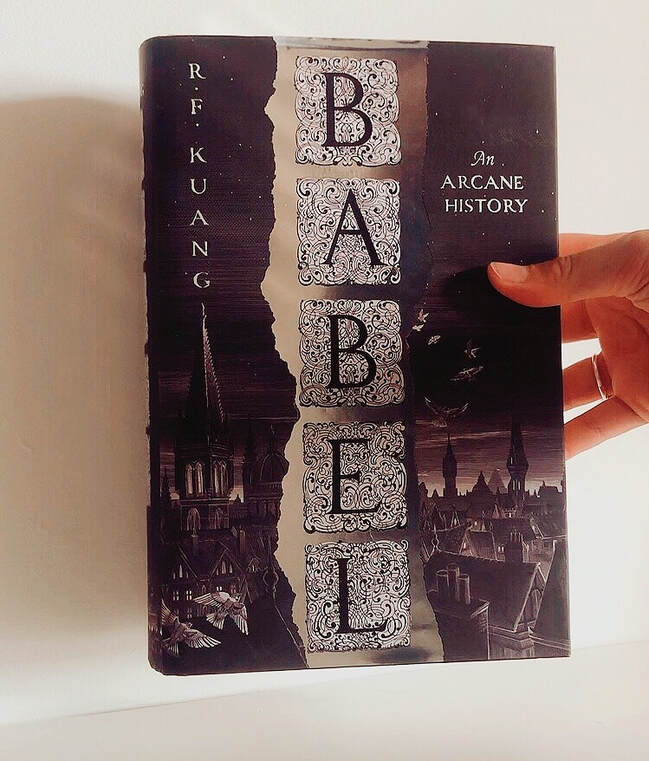Babel:
an Arcane History of the Oxford Translators' Revolution
an Arcane History of the Oxford Translators' Revolution
Author: R. F. Kuang
Published by: Harper Voyager
Pages: 544
Format: Hardback
My Rating ★★★★★
Published by: Harper Voyager
Pages: 544
Format: Hardback
My Rating ★★★★★
An act of translation is always an act of betrayal.
Oxford, 1836.
The city of dreaming spires.
It is the centre of all knowledge and progress in the world.
And at it’s heart is Babel, Oxford University’s prestigious Royal Institute of Translation.
The tower from whih all the power of the Empire flows.
Orphaned in Canton and brought to England by a mysterious guardian, Robin Swift thought Babel a paradise.
Until it became a prison… But can a student stand against an empire?
Oxford, 1836.
The city of dreaming spires.
It is the centre of all knowledge and progress in the world.
And at it’s heart is Babel, Oxford University’s prestigious Royal Institute of Translation.
The tower from whih all the power of the Empire flows.
Orphaned in Canton and brought to England by a mysterious guardian, Robin Swift thought Babel a paradise.
Until it became a prison… But can a student stand against an empire?
My thoughts:
Robin paused, too dazzled to follow. Of all the marvels of Oxford, Babel seemed the most impossible – a tower out of time, a vision from a dream. Those stained-glass windows, that high, imposing dome, an illumination in a medieval manuscript; a door to a fairy land. It seemed impossible that they should come here every day to study, that they had the right to enter at all. Yet here it stood, right in front of them, waiting. Anthony beckoned, beaming. ‘Well, come on in.’
Babel tells the story of Robin, a Chinese boy taken from his homeland to England where he is made a ward by a mysterious benefactor, Professor Lovell, who keeps him at an arm’s length. He is trained in the art of language, he trains for years in Latin, Ancient Greek, and Chinese, all in preparation for the day he'll eventually enrol in Oxford University's prestigious Royal Institute of Translation — also known as Babel.
Babel is the great Oxford translation institute in an alternative version of Victorian England, where translators hold the keys to the British empire. Every device and engineering technique there is, from steam trains to the foundations of buildings, relies on silver bars enchanted with “match pairs”; words in two different languages that mean similar things, but with a significant gap between them. The fantastical elements underpin real history, rather than alter it and silver magic is what makes everything happen.
Admittedly, the plot is a little complicated. The pages are heavy with footnotes; not the typical whimsical ones, in the style of Susanna Clarke or Terry Pratchett, but academic notes that help further set the mood of historical magical realism. But most importantly, the fantasy is easy to understand for most readers and isn’t overwhelming. The prose is packed to the brim with commentary and taking apart complex themes - it makes the reader work but it also presents itself in a straightforward, easy manner.
Kuang’s writing can be very technical, and often reads like a textbook. Despite the dense, lecture-like paragraphs about etymology and the history of language, Babel is incredibly immersive. The story is told so well with the magical aspects of silver not straying too far from reality, that it feels like this could be an alternate history of the world we currently inhabit. The way these fantasy elements are incorporated feels plausible, and the who and why this power is being sought, all too probable.
Robin, Ramy, Victoire, and Letty are all meticulously drawn characters. While their bond is fiery and passionate, they aren’t afraid to test the limits of their differences, and I loved seeing their friendships blossom. It presents a true sense of camaraderie amongst likeminded souls. I enjoyed getting to know the whole cast of characters, but found the narrator, Robin, perhaps the most fascinating. He is a soft, passive boy who struggles deeply with feelings of gratitude, insecurity, and resentment for the English and the university that he attends, ever increasingly aware of their colonisation of his home. For most of the book, he grapples with impossible decisions. He was taken to Babel without choice, but he feels at home in the tower, which feeds his hunger for knowledge. Staying at Babel feels like a betrayal, but the enormity of the other option frightens him: join the secretive Hermes Society to take a stand against Britain’s abuse. This is a biting, real, and beautiful character study and his personal development is handled with great care.
When he first arrives in Oxford, the city of dreaming spires, the place feels like a fairy tale for Robin; a utopia dedicated to the pursuit of knowledge. But knowledge serves power, and for Robin, a Chinese boy raised in Britain, serving Babel inevitably means betraying his motherland. Bright children are taken from all corners of the empire, fluent in Chinese or Arabic, raised in England, and put to work at Babel to translate, thus finding new match pairs and making new magic – but it soon becomes clear that the magic silver is only ever used for the benefit of the rich in London, and to the detriment of those the translators must leave behind in their colonised homelands.
Much like Kuang’s previous work with The Poppy War series, Babel is well researched and loosely based around real history.Babel has the weight of a modern literary classic, although it is a unique blend of historical fiction, fantasy, and nonfiction.
Not only is this a fantastic example of dark academia, but I think Babel should also be highly praised for its historical magical realism. Often the allure of fantasy fiction is an escape from the real world, but there’s no escape here; Kuang’s use of the genre does not soften real history but sharpens it. Babel asks what people from colonised countries are supposed to do when they reach positions of power. The story presents many brutal truths - the violence behind academia. The cost of knowledge as a resource.
Babel is extraordinary. Through a meticulously well-researched and impressive study into linguistics and the politics of language and translation, the author weaves a story that is simply impossible to put down. It feels like a stunning nonfiction perfectly blended in fantasy world and dark academia.
It is everything I long for in dark academia, a very polished, complex, and ambitious novel, with an ending to blow down walls.. It really surpassed all my expectations, and I was lucky enough to meet the author at an event in Bath during her UK book tour. Babel is a standalone, but I look forward to reading future projects from R. F. Kuang. Hopefully we won't have to wait too long!
Overall reaction:
Babel is the great Oxford translation institute in an alternative version of Victorian England, where translators hold the keys to the British empire. Every device and engineering technique there is, from steam trains to the foundations of buildings, relies on silver bars enchanted with “match pairs”; words in two different languages that mean similar things, but with a significant gap between them. The fantastical elements underpin real history, rather than alter it and silver magic is what makes everything happen.
Admittedly, the plot is a little complicated. The pages are heavy with footnotes; not the typical whimsical ones, in the style of Susanna Clarke or Terry Pratchett, but academic notes that help further set the mood of historical magical realism. But most importantly, the fantasy is easy to understand for most readers and isn’t overwhelming. The prose is packed to the brim with commentary and taking apart complex themes - it makes the reader work but it also presents itself in a straightforward, easy manner.
Kuang’s writing can be very technical, and often reads like a textbook. Despite the dense, lecture-like paragraphs about etymology and the history of language, Babel is incredibly immersive. The story is told so well with the magical aspects of silver not straying too far from reality, that it feels like this could be an alternate history of the world we currently inhabit. The way these fantasy elements are incorporated feels plausible, and the who and why this power is being sought, all too probable.
Robin, Ramy, Victoire, and Letty are all meticulously drawn characters. While their bond is fiery and passionate, they aren’t afraid to test the limits of their differences, and I loved seeing their friendships blossom. It presents a true sense of camaraderie amongst likeminded souls. I enjoyed getting to know the whole cast of characters, but found the narrator, Robin, perhaps the most fascinating. He is a soft, passive boy who struggles deeply with feelings of gratitude, insecurity, and resentment for the English and the university that he attends, ever increasingly aware of their colonisation of his home. For most of the book, he grapples with impossible decisions. He was taken to Babel without choice, but he feels at home in the tower, which feeds his hunger for knowledge. Staying at Babel feels like a betrayal, but the enormity of the other option frightens him: join the secretive Hermes Society to take a stand against Britain’s abuse. This is a biting, real, and beautiful character study and his personal development is handled with great care.
When he first arrives in Oxford, the city of dreaming spires, the place feels like a fairy tale for Robin; a utopia dedicated to the pursuit of knowledge. But knowledge serves power, and for Robin, a Chinese boy raised in Britain, serving Babel inevitably means betraying his motherland. Bright children are taken from all corners of the empire, fluent in Chinese or Arabic, raised in England, and put to work at Babel to translate, thus finding new match pairs and making new magic – but it soon becomes clear that the magic silver is only ever used for the benefit of the rich in London, and to the detriment of those the translators must leave behind in their colonised homelands.
Much like Kuang’s previous work with The Poppy War series, Babel is well researched and loosely based around real history.Babel has the weight of a modern literary classic, although it is a unique blend of historical fiction, fantasy, and nonfiction.
Not only is this a fantastic example of dark academia, but I think Babel should also be highly praised for its historical magical realism. Often the allure of fantasy fiction is an escape from the real world, but there’s no escape here; Kuang’s use of the genre does not soften real history but sharpens it. Babel asks what people from colonised countries are supposed to do when they reach positions of power. The story presents many brutal truths - the violence behind academia. The cost of knowledge as a resource.
Babel is extraordinary. Through a meticulously well-researched and impressive study into linguistics and the politics of language and translation, the author weaves a story that is simply impossible to put down. It feels like a stunning nonfiction perfectly blended in fantasy world and dark academia.
It is everything I long for in dark academia, a very polished, complex, and ambitious novel, with an ending to blow down walls.. It really surpassed all my expectations, and I was lucky enough to meet the author at an event in Bath during her UK book tour. Babel is a standalone, but I look forward to reading future projects from R. F. Kuang. Hopefully we won't have to wait too long!
Overall reaction:


